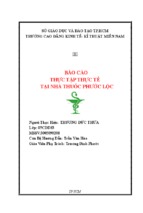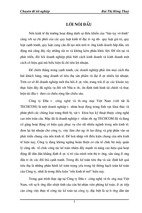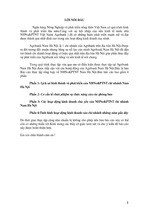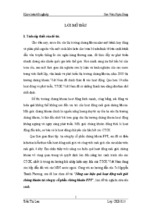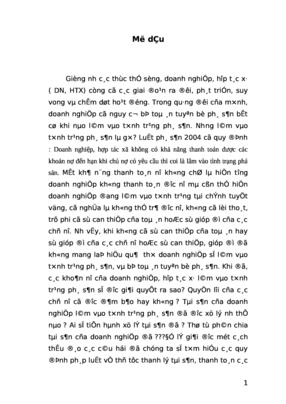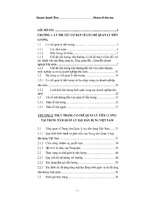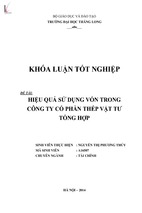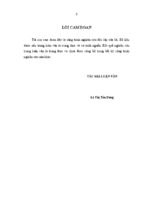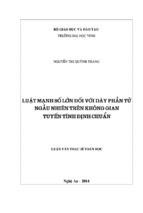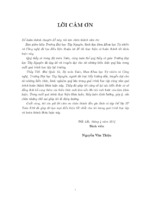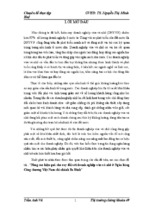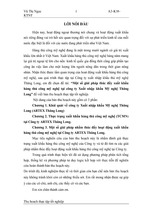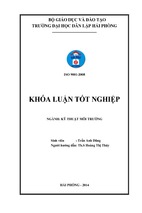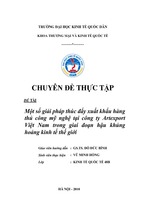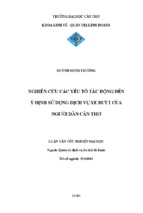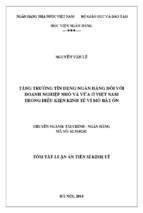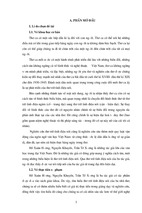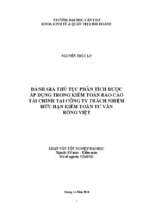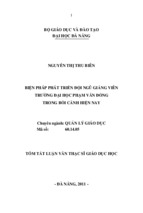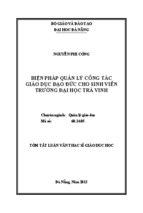CAN THO UNIVERSITY
SCHOOL OF SOCIAL SCIENCES AND HUMANITIES
ENGLISH DEPARTMENT
HUMAN DESTINY REFLECTED IN
UNCLE TOM’S CABIN (HARRIET BEECHER
STOWE) AND THE MISERABLE (VICTOR HUGO)
THROUGH READER-RESPONSE CRITICISM
B.A. Thesis
Supervisor: Hồ Phương Thùy, M.A.
Researcher: Trần Thị Nhi
Code: 7106999
Class: NN1054A3
Course: 36
Can Tho, May 2014
DECLARATION
I hereby declare that “Human Destiny Reflected in Uncle Tom’s Cabin
(Harriet Beecher Stowe) and The Miserable (Victor Hugo) through Readerresponse Criticism” is the result of my original work and all sources have been
quoted and acknowledged by means of complete references. This thesis has not
been published and is not concurrently submitted to any other degrees.
May, 2014
Supervisor
Researcher
Ho Phuong Thuy
Tran Thi Nhi
i
ACKNOWLEDGEMENTS
First of all, I would like to express my deepest thank to my supervisorMs Ho Phuong Thuy who is wonderful in both her immense knowledge and her
great character. I totally appreciate her literature’s understanding, which is
applied to ‘civilize’ my awareness and to sharp on my ideas more deeply
whenever I have opportunities to discuss and work with her. She always
maintains her kindness and encouragement to solve my problems when I am in
troubles. Her patience and enthusiasm strongly motivate me and help me to
never give up. She not only provides me with many useful sources but also
keeps inspiring me to complete my thesis. I am possibly affected by her advice
and guidance that help me to succeed in both my work and my future life.
Therefore, I am so grateful to have her power and ambition in my work.
Secondly, I am so thankful to attend Ms Truong Thi Kim Lien’s literary
classes. She is the first teacher who has taught me about Uncle Tom and how
poor destiny that he has to suffer. From that point, I am really attracted and it
lays the foundation for discovering the miserable. Her lessons are so wonderful
to give me the useful knowledge of Western literature. Her literary love truly
helps me to keep moving forward onto studying more about the wretchedness
through out literary world.
Finally, my deepest sincere and my appreciation go to English
Department, two selected work’s authors, critics, my family and my best friends
who always motivate and give me a great deal of strength to work well on my
paper.
ii
TABLE OF CONTENTS
Introduction................................................................................................ 1-12
1. The overview of two authors and their two selected works ....................... 13-21
2. The analysis of the wretchedness of human destiny
reflected in two works.................................................................................. 22-42
3. The comparison of authors’ view of humanities ....................................... 43-54
Conclusion ....................................................................................................... 55
Works Cited ................................................................................................. 56-58
iii
ABSTRACT
The thesis studies how human destiny of the westerners in the ‘civilized’
countries in the nineteenth century through the lens of Reader-Response,
especially Marxist and Feminist Criticisms and investigates the ways that
societies behave the bottom classes. This work will research the truly human
values and examine the ways in which the two writers- Harriet Beecher Stowe
(American) and Victor Hugo (French) evaluate the infelicity as well as denounce
the social problems. Analyzing, using comparative and deductive skills will be
applied to clarify the truth of human states and point out the literary valuehumanity. In Uncle Tom’s Cabin and The Miserable, three portrayed
protagonists share the similar miserable situation created by the evil Western
societies. Uncle Tom is an honest American servant who has to pay the price of
‘his color’ due to serious discrimination. The French man- Jean Valjean does not
receive the society’s acceptance because of his ex-convict in the past in spite of
his intelligence and talent. Together with Jean Valjean, Fantine, a beautiful and
innocent girl, is buffeted by social prejudice. All of them are treated cruelly but
their beautiful souls and goodness are kept. It reflects the humanities of two
respectful writers and proves that individuals should be evaluated regardless of
their colors, their undesired past or their genders.
iv
INTRODUCTION
Literature is considered as the recording of the human heart and
experience with the history and cultural values. It creates another world which
we only see through reading literature; “There is no frigate like a book- to take
us lands away.” (Dickinson par.1). Therefore, literature becomes one of the most
important aspects in lives. It reflects the society and makes us think about it in
order to understand more about the past. Numerous literary works are released to
enrich the literary world. These works are successful thanks to not only the
writer’s talented writing skills but also their whole hearts and marvelous
ideology of humanity; In fact, “while it takes years to really know a person
through a relationship, literature distills humanity into words”. This reflects that
“the literary work is the author himself” and it makes us admire the writers due
to covering the value of literature which includes the meaningful and longlasting contribution. When a work can take reader’s hearts, the work and its
writer will be survived forever. That is the reason why Harriet Beecher Stowethe well-known American writer and Victor Hugo- the famous French author are
appreciated all the time. They contribute to the literary world by portraying
historical events deeply and truly in their famous writings. Thanks to these
papers, the young generation has opportunities to study and discover how human
destiny was reflected in the past. As a person who lives for literature, I am
interested in reading the great writings related to history and human behavior in
the past especially in the western culture. To study more about the new culture
with historical values, I cannot stop discovering them because I feel painful and
indignant for inferior people and also feel angry with the cruel scoundrels
especially the evil societies. Though covering the civilization and humanity,
these societies allow them to treat people badly and cruelly just because of color
differences or prevent their talents and ambitions developing due to the poverty.
The good and gentle residents cannot show their dreams even if surviving in this
unequal society. Although they can be aware of unjust societies and totally have
1
experience in this dark lives, they do not have enough capacity to fight against to
get freedom and better life. Therefore, the appearance of some literary works
related to this problem helps them to have useful knowledge and strongly
motivates them to stand up and struggle. In reality, these works have the value
of both the content and the history.
As for me, I am used to behave equally due to living in communist
society and having the freedom. Besides that, I can live in my way and follow
my dreams as well as show my talents even I am not rich. In addition, I also
have studied many stories about humiliation that Vietnamese had to undergo
during the war due to losing the freedom and being poor under the cruel politics
of “civilized” countries. Therefore, I deeply understand how difficult and unjust
people have to suffer, and I absolutely share with them. The humanity and love
of people help me to come to them- the miserable and discover them. I strongly
believe that they have totally great characters and are loved by all though they
suffer from the grim destiny.
I made the thesis “Human destiny reflected in Uncle Tom’s Cabin
Harriet Beecher Stowe) and The Miserable (Victor Hugo) through Readerresponse Criticism” because I would like to investigate the injustice and evil
society that makes people disappointed with their destiny throughout the main
characters. Marxist and Feminist criticisms are applied to help readers to
discover the writings more deeply based on the social and dialectic theory; we
will understand the human fate clearly and easily throughout the describing of
two excellent authors- Harriet Beecher Stowe and Victor Hugo in their most
famous works. Throughout this, the readers will understand more about how
miserable westerners have to face as well as unequal politics in the
contemporary societies. Besides that, this paper also includes the comparison of
both writings and writers to discover the author’s perspective and love that they
offer to the miserable as well as the evil societies, which have strong effect on
their lives, are exposed clearly. We will understand more about how writer’s
humanity reflected in their works. To complete this paper, critical analysis will
2
be applied and the oriented ideas will be arranged logically. Marxist and
Feminist theory will be used to clarify the character’s destiny basing on
historical and social background. To sharpen my thesis, I am also concerned in
the related studies, critiques and essays which give me more information about
both writers and writings. Reading comprehension will be used to understand
the two stories- Uncle Tom’s Cabin and The Miserable and other related papers.
After analyzing the miserable human destiny in two selected works, I also apply
the comparative skills to figure out the similarities and differences of the
characters’ states in western society as well as the author’s humanity that is
expressed in some aspects.
Harriet Beecher Stowe and Victor Hugo are appreciated in both their
talented writing skills and their charity to the inferior classes. They describe
every character deeply with different personalities and situations which change
his feeling and behavior to serve his real states. Each character with different
destiny which is either good or grim, figures the true contemporary social face if
we discover him through reader’s response, especially Marxist and Feminist
critical lens. I decide to divide my thesis into three chapters which help me to
transfer my cherished ambition with deeper and clearer study through every part.
Chapter 1 will introduce about the historical background and the authors with
important events that urged them to produce these novels. Besides, it also
includes the story summaries that cover all writing development. Chapter 2
focuses on analyzing human destiny of the main protagonists reflected in two
selected works under Marxism and Feminism. We will understand how
miserably westerners suffered in the 19th century. Chapter 3 will give the
comparison of historical background, people’s lives and the author’s perspective
in two different countries and then figures out similar characteristics of western
human destiny and the writers’ humanities.
Reader-Response Criticism
Reader-Response criticism is a literary theory that primarily focuses on
the readers and their experience of the literary works. Reader-response criticism
3
argues that literature should be viewed as a performing art in which each reader
creates their own, possibly unique, text-related performance. Marxism and
Feminism are two main means of Criticism that are applied to complete my
work. They are combined to clarify the westerners’ infelicity through some
aspects, especially social class ranking and gender difference.
Marxist Criticism is indebted to the political theory of Karl Marx who is
primarily a theorist and historian. He plays an important role in distributing
people’s awareness about the poor people’s rights and the struggles between the
inferior classes and the oppressors. Marx is talented and successful in building
the theory related to the workers. DiYanni (391) gave a comment that:
Marxist critics reflect literature for its reflection of how dominant elite
and middle-class values lead to control and suppression of workingclasses. Marxist critics see the literature’s value in promoting social and
economic revolution, with works that espouse Marxist ideology serving to
prompt the kinds of economic and political changes to conform to
Marxist principles
When the profits are not reinvested in working-classes but in creating more
factories, they will be grown poorer until the revolution happens successfully
under possible and perfect system. That means struggle is the best way to
change the destiny and gets better lives between oppresses and oppressing.
According to Marxists, literature is reflected those social institutions with a
particular ideological function. Literature reflects class struggle and materialism;
thought how often the quest for wealth traditionally defines characters. So
Abrams (149) figured out the significant application of Marxist view in
literature, "it not as works created in accordance with timeless artistic criteria,
but as 'products' of the economic and ideological determinants specific to that
era". Therefore, Marxist criticism generally approaches literary works as
products of their era, especially as influenced, even determined by the economic
and political ideology that prevail at that time of their composition. “Marxist
criticism is concern both with understanding the roles of politic, money and
4
power in literacy works and with redefining the reforming the way society
distributes its resources among the class’s relation.” (DiYanni 391). This is an
equal lens to understand and advocate the miserable that are oppressed in the
unjust society. Therefore, when coming to them, we will know clearer about the
real situation of social rank and status as well as study the writings more
successfully.
Together with Marxism, Feminism is also used to clarify the women’s
miserable situation. In the nineteenth century, Westerners were treated badly due
to not only different social classes but also different genders. Women are
considered as inferiors who have a little of the legal, social, political rights that
are granted in western countries. They are limited both educational and
employable opportunities. They have to follow the unequal rules and accept
society’s prejudice if they have any mistakes. In 1848, a group of women and
men drafted and approved the Declaration of Rights and Sentiments which was
considered as the declaration of women’s rights. From that point, women
continued to struggle in order to receive their own rights. Therefore, they
showed their experience and their voice in literature and took society’s
compassion. Thus, Feminism was built in literary world to speak up the
women’s
infelicity
and
to sympathize
with them.
Feminist
literary
criticism is literary criticism informed by feminist theory or by the politics
of feminism more broadly. It can be simply understood as using feminist
principles and ideological discourses to critique literatures language, structure
and being. Besides, Feminist criticism is concerned with “the ways in which
literature (and other cultural productions) reinforce or undermine the economic,
political, social, and psychological oppression of women" (Tyson par.3) In
addition, feminist criticism was further concerned with the exclusion of women
from the literary canon, and Tyson suggests this is because the views of women
authors are often not considered to be universal ones. Therefore, women’s
destiny will be understood more clearly through feminist critical lens.
5
In the western of 19th century, people suffered all wretchedness when
they were born. They work hard in harsh conditions to serve the society and face
the tragic situation even though they are honest, talented and well-behaved to the
others. They have love, family, work,…but in society, they are just inferior
classes and are oppressed by higher social classes. They cannot change their
destiny until they finish their poor lives. They were born in poverty and covered
the miserable destiny under lower social statues; they are not allowed to have
human rights, freedom, or carry out their dreams even living with their own
families. All of these things are forbidden by the social politics. The poor never
become the rich though they are intelligent and work very hard as well as the
black never put off the slavery and get freedom as the white though they have
great personalities and good ambitions. It would be better if they did not come to
the world of cruelty which forces the miserable to the hell. All of the unequal
things are written and portrayed clearly in two great novels- The Miserable and
Uncle Tom’s Cabin which are never forgotten by numerous readers.
Uncle Tom’s Cabin is appreciated highly and its most value is that
opening the eyes of millions Americans and Europeans on the great shame of
America- the Negro slavery. Dinh (89) recognized that the success of Uncle
Tom’s Cabin is inevitable because of the obvious reasons, “it reflected the idea
that slavery in the United States, the nation that purportedly embodied
democracy and equality for all, was an injustice of colossal proportions”. She
also appreciated its value which plays an important role in abolishing the slavery
in America. It seems to be concerned as the first novel that has touched upon the
social problems of the time in American Literature. (“American Literature” 89).
In the 19th century, the black people are sold and bought many times as
products, becoming slavery who are treated badly as inferiors in society. The
White- their masters have rights to control them, even punishing or killing.
Green pointed out “a master could be held criminally liable only if the slave he
killed was completely submissive and under the master’s absolute control”
(par.7). The white deny the slaves opportunities of studying how to read and
6
write to protect against their forming aspiration that could lead to escape or
rebellion. Slavery is depicted as “evil not for political or philosophical reasons”
(Dinh 91) but mainly because discrimination divides families, destroys normal
parental love and is inherently un-Christian. It forces the husband to live far
away the wife, mother away the children and these crimes are against sanctity of
domestic love.
Carrying the historical and humanity values, Uncle Tom’s Cabin is one of
the few works that is appreciated and admired by many talented authors in all
over the world. Tolstoy mentioned Uncle Tom’s Cabin on his short list of
“example of the highest art following from love of God and man” (qtd.in Green,
“Deceiving America”). This writing is also evaluated as a heart of typical 19th
century melodrama of mixing of feelings and historical events: cruelty,
suffering, religious devotion, broken home, improbable reunions (Robbins
par.2). According to Bailey, he acknowledged the values of this writing. Uncle
Tom’s Cabin is so wonderful with a noble effort and splendid success. He
believed that “the work to us give evidence of greater power, of deeper and more
various resources, than any other novel of the time.” (par.4).
Uncle Tom’s cabin seems to be a real evidence of color discrimination in
America of 19th century. Harriet Beecher Stowe is totally successful in
describing this dark lives throughout some typical character’s destiny. Green
(par.11) expressed:
The result was a series of fictional sketches of slaves under physical or
psychological assault- among them, the beautiful Eliza, who escapes from
bounty hunters by leaping from ice floe to ice floe across the Ohio River
with her baby in her arms; the brooding Cassy, who belongs to the brutal
Simon Legree; and Tom himself, whose gentleness and generosity grow
apace as he is sold father and father south, eventually to Legree, who
7
torments and tortures him before ordering his overseers to beat him to
death.
Parrker et al. gave a comment that the writer clarifies how miserable
human destiny is in her time by her past experience and builds the charactersTom and Eliza with her own suffering and oppression as well as her
determination to be free. That helps her to have a deep power to produce this
novel which is such phenomenal success. (1606). Come to slavery by her whole
heart, convincing the northern reader help to end the discrimination is the main
goal for her to start this novel, “most immediately, the novel served as a
response to the passage of the Fugitive Slave Act of 1850, which made it illegal
to give aid or assistance to the runaway slave”. (Truong 45). She also included
Tom embodies noble hero who always spreads some of love and goodwill of his
religious beliefs to everyone he meets especially the poor slaveries. Though he
does accept his destiny of inferior happily, he helps the runaways to keep the
secret. Tom’s passivity is one of his limitations but his personal and “his heroic
model behavior should be practiced by everyone, black and white.” (51).
Riss argued in his writing “Racial Essentialism and Family Values in
Uncle Tom’s cabin” about the role of the authors in the 19th century, especially
Harriet Beecher Stowe’s. He expressed:
Stowe’s understanding of the priority of race in forming a Negro’s
character certainly would not have surprised her contemporary readers.
Indeed, during the Antebellum period, it would have been more
surprising had Stowe done anything other than attribute cultural
differences to race. As one historian of ethnology has stated. Although the
United States shared in a general Western movement toward racialist
thinking, American writers in the years from 1830 to 1850 led Europeans
in expounding views of innate racial difference. (513)
8
Hinkle realized the cruelty of slaveholders though they were
characterized as good patrons. She included that Mr. Shelby is considered as the
best slave owners and great father of the poor slavery. However, in order to save
himself from the immense financial dept, “he is forced to sell Tom as well as
Eliza’s son Harry to the unscrupulous trader, Haley. In doing so, he will be
breaking up two families, taking children from parents and separating husbands
and wives". (Hinkle par.11). She mentioned about Eliza’s unequal destiny and
the real happiness when she gets freedom. Though she is behaved well in Mr.
Shelby’s house and his wife loves her as her daughter, she is not a white woman
with natural rights. In contrast, she is a black slave with maternal love for her
son- Harry. Hinkle emphasized:
George and Harry’s time in the Quaker home is womb-like, comforting;
they are reborn into freedom after passing through the fostering care of
these abolitionist people of conscience Stowe calls upon abolitionists of
her time to offer this kind of fostering to freedom with Christian patience
and affection. (par.18).
The Miserable by Victor Hugo is appreciated by millions readers because
it is not only a valuable symbol of his success but also a pride of the whole
world. Before starting this novel, he had changed the view of independence and
Empire; he commented himself “five years ago, I was on a point of becoming
the favorite of the king. Today, I am on a point of becoming the favorite of the
people.” (qtd. in Maurois, “the life of Victor Hugo”). He will never be the one
any other than he was the other, for the moment will come when his feelings of
independence will rise to the surface. (279). Maurois (353) confirmed that the
story’s material is the general knowledge based on the fact, including building
the character’s destiny and reproducing the history. Therefore, this novel has
come to be accepted by the whole world as one of the great works of the human
image.
9
As a phenomenon in the 19th century in French literature, The Miserable
has totally taken the reader’s heart by the real contemporary social and political
issues.
Turner
(par.34)
believed
that
“the
experience
of The
Miserable undergoes a similar process of extremes colliding from different
societal and political vectors.” Therefore, The Miserable is perhaps the last great
literary masterpiece to achieve a wide readership among all classes of society at
the first time it appears. Both writer and writing are absolutely embraced the
people as both subject matter and audience to the maximum degree. The
convicts, the prostitutes, the revolutionary youth, students and working-class
would not only form the plot of this work, but a large percentage of those who
would read or at least hear the story read out loud. (Turner par.11).
Under Marxist criticism, the novel’s success is enhanced by the historical
value. It helps the reader to study the human destiny easily as well as the
poverty, unequal society and struggle. Nordby saw the closed relationship
between the Marxist critical lens and the novel in interpreting the human poor
fait especially in Fantine’s situation. She analyzed:
If you were to interpret this scene through a Marxist lens, one could say
that Fantine's situation is because of the division between the classes. If a
woman of higher birth had child out of wedlock, she perhaps would not
have experienced such a massive change in status. Moreover, when
Fantine is attacked by a richer, more privileged man, Javert immediately
takes his side. Because Fantine is a prostitute, her word has no merit.
The class system failed Fantine. (par.3).
The story is successful in combining with the reality, covering a deep
meaning and it is also the opposite between the dark and light, paradise and hell,
that makes the distance among human destiny not only the social position but
also in deep morality. Dang et al. (500) showed this viewpoint in their criticism.
They emphasized that the dark-light image seems to be the beginning and
ending of the novels’ protagonists, though he has to face many challenges even
10
the death, he tries to survive not only for him but also for rescuing the miserable
especially the women and the children. They also showed the poor destiny
through the typical characters in The Miserable. Fantine with the image of a
woman without shoe walking the street to get food, and works in the factory but
is fired later; she embodies numerous other people’s fate in the industrialization
cities in this times. Valjean is an ex-convict who struggles to redeem himself
morally and find the acceptance in society under assumed name for his past
mistakes. He has to change his name many times to become a good person.
(499).
Really, Victor Hugo builds the characters basing on the real social
situation including his faith to the right people and his disappointment to the
contemporary laws. Iosue (par.13) expressed in his writing “Les Miserable” that
Hugo does not believe in the social politics, “though the religion is part of the
chain, the law is not”. Iosue proved his criticism by Victor Hugo’s points in
completing his two characters- Bishop Myriel and Javert. The priest, who
represents for God, helps the poor ex-convict -Valjean by giving him shelter and
protects him by telling lies for his stealing. Therefore, Valjean is reborn and
becomes a good person who helps other miserable people and is loved by all. In
contrast, Javert, representing unjust, unquestioning law, pursues him relentlessly
until Javert commits suicide in the face of the truth that the law is wrong. Iosue
also included Hugo’s viewpoint; That is society should not break the laws, but
the laws should be just and more reliable.
Like Iosue, Arms realized Hugo’s talent in writing as well as the value of
The Miserable. Its influence has been pervasive, both on the development of
modern literary realism and on popular culture in general. He (par.2) appreciated
the novel contributing in literature in his study “Les Miserable by Victor Hugo
in nineteenth century literature criticism” by a comment:
While a work of fiction, the novel also provides insight into and
commentary on numerous historical, political, and philosophical
11
subjects, ranging from Napoléon’s defeat at Waterloo to the evolving
architectural landscape of nineteenth-century Paris.
With a deep investigation into character’s destiny, Femie (par.37) almost
realized the life of each character is influenced by several other characters. Their
destinies are entwined and to some extent at least, they are depended on one
another. He claimed that Jean Valjean takes care of Fantine’s daughter- Cosette
as the responsibilities for “Fantine's fall from grace and sets out to make
amends”. That is called “the key issue lies in the recognition of one's influence
and the acceptance of responsibility for it” instead of changing most profoundly
the challenges we may face in the real life.
12
THE OVERVIEW OF TWO AUTHORS AND THEIR TWO
SELECTED WORKS
Harriet Beecher Stowe (1811-1896) and “Uncle Tom’s Cabin” (1862)
Uncle Tom’s Cabin is considered as one of the greatest novels of
American Literature in the 19th century. Harriet Beecher Stowe shows both her
talented writing skills and her whole heart to the slaveries in her writing which is
appreciated as “at heart a typical nineteenth-century melodrama of cruelty,
suffering, religious devotion, broken homes, and improbable reunion.” (Robbins
par.2). The author discovers the miserable destiny and portrays the aspects of the
slave’s lives deeply and truly. According to Dinh (89), Uncle Tom’s Cabin
seems to open the eyes of millions Americans and Europeans on the great shame
of America- the Negro slavery. Therefore, hundreds of editions and millions of
copies have been sold around the world even though the value of the story is
misunderstood in a short time. Uncle Tom’s Cabin is remained the world’s
second most translated book, after the Bible and it has also taken a wide range of
readers.
It is important to remember that the novel is not just titled Uncle Tom’sit is named Uncle Tom’s Cabin which makes the cabin become the most
important symbol around. Though it is not mentioned in the novel regularly, it
carries the special meaning because it is the only Tom’s own place where he can
live peacefully and happily with his small family. He is proud of it because it is
full of his memories including his love’s family and his religiousness even
though it is not as big, beautiful and luxurious as his masters’ houses. There, he
has time for relaxing after hard-working day and he can show his talent in
cooking and he feels happy for receiving the admiration of little patron. That is a
dreamful life that he wishes. However, his real destiny is completely contrasted
to his cabin and it is a hurt to him whenever he suffers the pain and thinks about
it where he cannot return until he dies. The cabin becomes the opposite image of
13
Legree’s plantation where he is behaved cruelly and beaten brutally and it is
totally different from the cotton gin shed where Tom lies dying. Moreover, it
seems to be as a point of contrast of the cottage where George, Eliza and their
family are reunited in Canada where all people are gotten freedom. Though he
may not get back his cabin, the freed slave like him can create loving,
harmonious household like to it.
Race discrimination is a significant social issue because people use this
term as the basic for discrimination. It almost appeared about 1400s when
Europeans began colonizing African and America with the big idea “civilize the
savages” and they would become superior of other race they encountered. Color
discrimination is the system that practicing of denying people access to rights,
representation or resources based on racial differences. Moreover, it directly and
strongly affected every aspect in society. However, it is so important to
remember that color discrimination is neither natural nor inevitable. In United
States, the court ruling established applying chiefly to Black African from the
18th century. In the next one, there was a hardening of institutionalized racism
and legal discrimination against citizens of Africa, however the discriminatory
laws kept the black American disenfranchise particularly in the South. Under the
laws, the black were treated badly and unequally, compared to the white. They
were being legally prohibited to use the same parts of restaurant or beeches.
Moreover, they were totally forbidden to study how to write and read, or had
their own properties even they could make them. In contrast, they would become
criminals. Especially, they live in the society without freedom and were only
products which were bought and sold many times. In 1860s, 3.5 million slave
were sold in the South of America for serving the agricultural development
while industry was widen and needed numerous free workers, so the southern
American change their points to the slaves and they really wanted to abolish the
slavery.
Harriet Beecher Stowe (1811-1896) was born in 1811 in Litchfield,
Connecticut, into a respectable and famous family. Lyman Beecher- her father
14
was one of America’s most celebrated clergyman and followed the antislavery
movement. Her brothers- Henry Ward and Edward were famous preachers and
her older sister- Catherine pioneered in woman’s education. All of them were
dominated seriously by their father under the God’s lessons. In 1832, she
followed her father to Cincinnati. There she taught, wrote, and had heard many
slave’s stories from black freedman and white travelers in the South. She had a
wide range of knowledge by reading of antislavery literature and saw herself the
operation of the “Underground railroad”. In the age of 25, she got married with
Calvin Ellis Stowe who is one of the leading professors at Lane and then they
had seven children. During 18 years living across Ohio River from slaveholding
communities, she absorbed fugitive slaves and visited the South- Kentucky as
her first personal knowledge of Institute of Slaveries. In 1848, one of her sonsSamuel Charles died of illness that made her understand more about the
miserable of slave women’s separating from maternal love. In 1850, she
returned to New England when her husband was appointed to the faculty of
Bowdoin College in Maine. There, while seated at the communion table in the
Congregational Church that she received the inspiration for her most famous
writings “Uncle Tom’s Cabin” under divine direction of God as she later
reported. In 1862, President Lincoln called her “a little lady who wrote the book
that make the big war” when he first met her to express her novel’s enormous
success and the value to the struggle against the slaveholding South.
Uncle Tom’s Cabin by Harriet Beecher Stowe is the real story of the
miserable slaveries in the Southern of United States. Stowe focused on
portraying Uncle’s Tom - an African slavery with absolutely loyal to his masters
and he is a really religious man. He lives without freedom and totally suffers
mournfully and difficultly life trip. Due to working hard, he is behaved rather
well in his first master- Arthur Shelby. He lives happily in a small cabin and is
beloved by all. However, his destiny is changed awfully after Mr. Arthur decides
to sell him and another five-year-old talented child – Harry to Haley- a cruel
slave trader because of his immense dept even though he is not characterized as
15
- Xem thêm -


